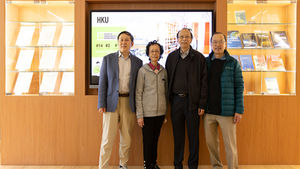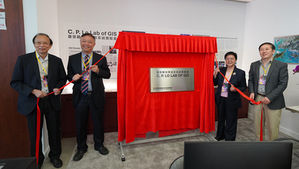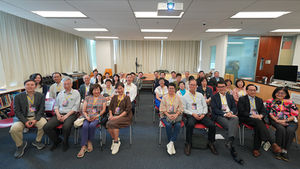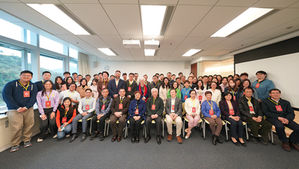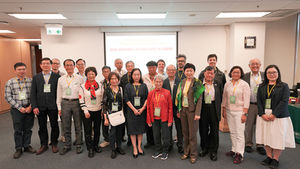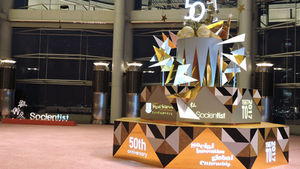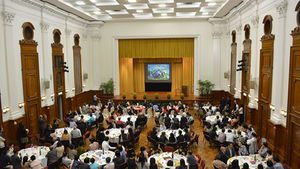
Alumni Sharing
Distinguished Alumni

Allan BRIMICOMBE
Professor of Geo-Information, University of East London, UK
MPhil (1985), PhD (1995) HKU Geography
I hold MPhil (1985) and PhD (1995) degrees from Geography, HKU. I’m proud that both my higher degrees are from Hong Kong.
I arrived in the Territory in 1977, aged 24, having spent a year travelling overland from UK. I started work as a geographer in consulting engineering doing mapping, geomorphology and aerial photographic interpretation. The Po Shan Road disaster in 1976 had prompted the government to undertake comprehensive slope mapping and classification, and I was part of that vital effort for public safety. I then moved onto opportunity and constraints mapping using my own GIS and 3-D visualisation software on mega projects such as the Tin Shui Wai, and the power distribution networks for the Daya Bay nuclear power station. I moved to HK PolyU as founding Head of the Department of Land Surveying and Geo-Informatics (LSGI) where I pioneered work on spatial decision-support systems for drainage basin planning. Much of my work in HK is captured in my book GIS, Environmental Modeling and Engineering.
Coming back to the UK in 1995, I decided to switch from analysing physical landscapes to the multi-dimensionality of big data landscapes, particularly getting down to the granularity of individual transactions. The spatial is still important because everything happens somewhere, whether you walk into a shop and buy something or do it online. Thus, I started doing research for the Metropolitan Police, National Health Service, International Olympic Committee, utility companies, management consultants and local authorities. I provided insights, for example, into repeat victims of crime, the relationship between urban layout and anti-social behaviour, usage patterns of accident and emergency in hospitals, impacts of the London 2012 Olympic Games, and recently mapped psychotic illness in England from 240 million GP prescriptions. I run MSc and Professional Doctorate programmes in Data Science. I have sat on policy advisory committees for government. In 2011, in recognition of my contribution, I was conferred Fellow of the Academy of Social Sciences. In 2017 I was appointed a Justice of the Peace.
Geography takes you as far as your imagination and your willingness to learn new things.
Alumni Events
Class Notes from Alumni
Miss Josephine Song
Class of 2012
So glad to hear from geography department's messages, it reminds me immediately that it is truely a wonderful time spent in HKU from 2012 to 2013, and this memorable event influenced me a lot. I began to be more confident and more open-minded. Now I participated quite a few events held by HKU alumni in Shanghai, and it means a lot to me to stay connected with my department of geography! I hope I could be able to meet more alumni of my faculty in Shanghai in the future. Hope you all well in hku, love you and miss you, my dear classmates and brilliant professors.

Ms Yoki Lee
Class of 2012
Being volunter to promote mental health at different organizations and participated into anti-Covid 19 programmes.

Mrs Kwan Hui
Class of 2010
At the end of August 2022, I am excited to transition to the Delaware River Port Authority (DRPA) as Manager for the Office of Grants Administration, while continuing to collaborate and partner with my current employer (Delaware Valley Regional Planning Commission, DVRPC) on long-range planning and project investments. I hope to achieve additional federal funding to move the Glassboro-Camden Light Rail project forward, including other projects that will improve the agency's heavy rail line/stations and toll bridges.
Ms Grace Chan
Class of 1997
Got new challenges! Promote to a senior post in academic year of 2021 to 2022.
Mr Victor Fong
Class of 1981
After retirement from the HKSAR Government, I started volunteer work by serving as Commissioner of the Caring for Ethnic Minorities Charitable Organization and Advisor of the Xu Shan Charitable Foundation, and recently being appointed as Member of the Hospital Governing Committee of the Hong Kong Eye Hospital and the Kowloon Hospital. Hopefully, will shortly start an environment project to revitalize an abandoned hostel site in Wan Tung Wan, Lantau, into a Sustainable Living Experience and Nature Education Centre.
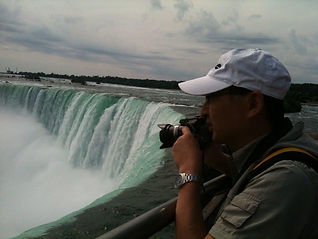
Professor Victor Sit
Class of 1970
New books!
Chinese History and Civilisation: an Urban Perspective
The emergence of a city marks the beginning of a civilisation. The city, especially the leading cities of a country, is also where the major features of a country are contained and where historical events play out. This book introduces readers to the progress of China's civilisation over more than 5000 years of history, through the rise and development of its cities.From the prehistoric Yangshuo and Longshan periods all the way to the People's Republic, this book outlines major events and developments to highlight the evolution of the Chinese civilisation. Using historical dynasties and urban dynamics as vertical dimensions, it examines major historical events, economic developments, territorial changes, and other developments over China's long history. It also discusses the uniqueness of China's history and compares its civilisations to Western experiences.
中國城市文明史
城市不但是文明出現的標記, 也是文明最重要的載體, 文明的演變亦因而往往在城市結構、功能和城市的空間分佈中體現。「對『中國城市文明史』的構建,我走過了漫長的五十年。」薛鳳旋教授專攻城巿、區域發展、基建和發展策略研究,是城市發展的系統研究者。本書由史前史說起,參考了大量相關的中西文獻材料,從軍事和政治體制、經濟狀況、領土變化等方面去闡釋不同歷史階段的城 市發展及演變,並輔以作者精心研製的約一百五十個圖表,以展示歷代城巿的性質、功能、結構,以及整個城巿體系的空間拓展形態和分 佈,從而還原五千年中華文明和城市的發展軌跡。作者在書中把中國文明、中國城市發展和中國歷史有機且系統地整合,並於書末對城市與文明的關係和中國的歷史經驗作出總結,以及 展望中國城市文明未來的發展,讓讀者可以參照圖文,更輕鬆地了解 國家和民族的過去、現在和將來。

Alumni Update Form
Thank you for staying connected with HKU Geography!
Completing the information update will help ensure the accuracy of your alumni record and
helps you to stay connected to your alma mater and your HKU Geography classmates.
(A) Personal Information
* Required Field
(B) Share your news, updates and stories (Optional)
We want to hear from you! Submit an alumni story telling us what you are doing and important events in your professional and/or personal life in the class notes below:
Upload Your Photo:
Option to upload an accompanying photo to be published online on the Departmental webpage/social media.
If you would like your class note to be considered for publication on our Departmental website and/or our social media, please provide consent below:
(C) Stay Connected
Privacy Statement:
Any information collected from this form is used primarily by our Department to help us contact you and/or otherwise serve your requests. We do not share your data with any individuals or organizations not affiliated with the University of Hong Kong. You can find the full University’s Privacy Policy Statement at https://www.hku.hk/about/policies_reports/privacy_policy.html.


Make a contribution to support the Department of Geography.
(The department will recognize your donation on our website)
Payment Method: Cash / Cheque / Bank Transfer























